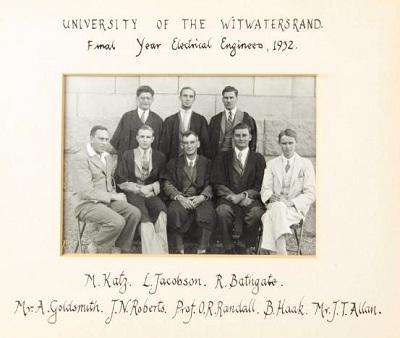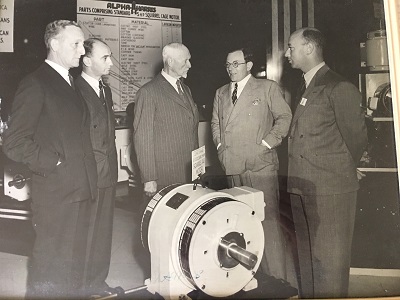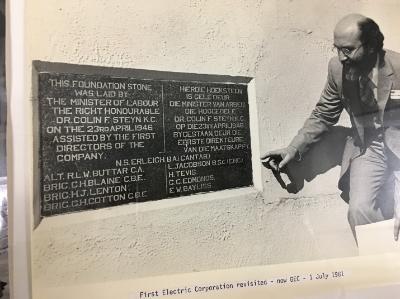A dynasty of engineers
-
Three generations of tech Jacobsons serving society
He was dutiful but difficult, brilliant but impatient, sure of his opinions and his direction. At his funeral in 1960, an elder brother was overheard to say: “There goes the man with all the answers.” He was also an “upstart colonial”. What did the top business people in England and America make of this young South African some 80 years ago when he dared to negotiate deals with them?
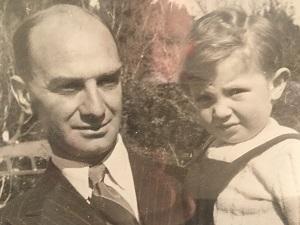
His son, who hardly knew him as he died tragically young, still wonders.
He was Louis Jacobson, the first of three generations of Jacobsons to pass through the School of Electrical Engineering at Wits. His son David and grandson Sven have also excelled in a changing and challenging world, supplying some answers themselves.
First that world needed raw materials and the power to extract them. Then it needed smarter, more efficient and more adventurous technologies and ways to make sense of information. And it always needs healing.
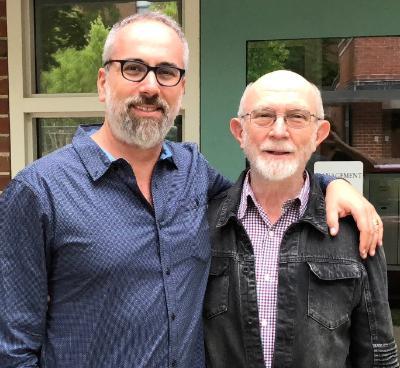
Pioneer in South African industry
Louis Jacobson, born in 1910 in Johannesburg, was an entrepreneur and an industrial pioneer. In his short life he stood out as a designer of heavy electrical machinery and a builder of major companies that manufactured it.
He graduated from Wits in 1932 with a BSc (Eng) in Electrical and Mechanical Engineering (this was before the term “electronics” had even been coined) and worked for two years at the Victoria Falls Power Company near Johannesburg. This company supplied electricity to industry, including the gold mines. He then founded Alpha Electrical, an electrical motor repair workshop. This became Alpha Harris Pty Ltd, a designer and manufacturer of professional electrical equipment, which grew into the renowned First Electric Corporation of South Africa Ltd (FEC), the first of its kind to be listed on the JSE. FEC made an important contribution to the World War 2 effort, for example by providing equipment for degaussing ships to protect them from magnetic mines. The company became today’s Actom, still a major producer of electro-mechanical equipment at Knights on the East Rand, once Louis’s head office.
In the late 1950s Louis’s entrepreneurial spirit was ready for a new creation: FWJ Electrical Industries Pty Ltd, which he formed and led, in partnership with Carl Fuchs. One of FWJ’s innovative developments was the world’s first earth-leakage protection device for use in the mining industry, greatly reducing deaths and injuries from electrical shocks.
Louis married Edythe Sonnenberg and they made a home in Oaklands, Johannesburg. At the time of Louis’s death from a brain tumour at the age of 49, his son David Harris Jacobson was only 17, in his first year at Wits, and so he never really knew his father in an adult relationship.
Talented and original
From an early age David was interested in electrical and electronic technologies, and he built stereo equipment and radio-controlled model boats. Louis gave him a well-equipped workshop at home to develop these scientific interests. Similarly, his sister Ruth Denise Leveson (née Jacobson, Wits BMus 1959) received a piano to develop her musical talent.
Mickey Milner (Wits BSc Eng 1957, PhD 1968) recalls David’s student days:
“I served as a lecturer in Electrical Engineering at Wits. It was evident then that David was an extremely bright, talented individual with enormous potential to make significant contributions in his chosen field of endeavour. We became firm friends, despite the fact that, even to this day, he claims (jokingly) that I spoilt his record of achieving first-class passes in all his final-year subjects, except for electrical machines, which I taught at the time.”
David graduated from Wits in 1963 (BSc Eng With Distinction) and married Lynne Yvonne Morris. Accepted for postgraduate studies at five of the world’s top universities, he chose Imperial College in London. There he began exploring a field that was the forerunner of artificial intelligence. No computer was up to the demands of the project and he was forced to abandon it, but that didn’t stifle his innovative spirit. He completed his PhD at Imperial in 1967 under another Witsie, Professor David Mayne (BSc Eng 1951, MSc Eng 1956), who says: “I would rank David as the most original PhD candidate among the many I have supervised.”
Prof Mayne recalls that David read a paper of his on differential dynamic programming and then, “showing characteristic originality, very soon proposed a major new idea: the use of ‘strong variations’ for determining an improved trajectory using optimization to choose an improved control by making large variations in the control over small intervals of time rather than the universal procedure of making small variations over large intervals of time. I did not at the time recognise the value of this proposal and tried to discourage David from proceeding with this line of research. Again, showing characteristic courage, David persevered, soon proved me wrong, and went on to produce a highly successful and revolutionary theory.”
Versatile algorithms
David Jacobson’s thesis, “Differential dynamic programming [DDP] methods for determining optimal control of non-linear systems”, used one of the most powerful computers of the day, the IBM 7090, to develop and test numerous new algorithms. The computational efficiency and range of applications of the algorithms attracted wide attention and use in fields such as aerospace, chemical, mechanical and other branches of engineering, economics, biosciences, robotics, artificial intelligence and dynamic games. For example, DDP was used in calculating optimal low-thrust trajectories for NASA’s Dawn mission to the outer solar system – 37 years after Jacobson and Mayne’s book Differential Dynamic Programming was published.
In 1967 Prof Mayne arranged for Harvard’s Professor Yu-Chi (Larry) Ho to meet David, and this led to an offer of a postdoctoral fellowship at Harvard. Professor Ho says:
“The Department of Electrical Engineering of Imperial College and the Engineering and Applied Science Division of Harvard University had a ‘special relationship’ during the second half of the 20th century involving many exchange visits. Mayne introduced me to one of his PhD students, whom he mentioned as especially bright and who was making a breakthrough in the area of Dynamic Programming. I was not disappointed in Mayne’s recommendation and subsequently hired Jacobson to begin at Harvard in 1968 as postdoc and as assistant professor. He was later promoted to Associate Professor. Jacobson was certainly a rising star in the international system control field, with a brilliant publication record and excellent career future.”
They kept in touch for more than 50 years and Prof Ho says he treasures their scientific and personal interactions.
Attracting expertise to Wits
David returned to South Africa in 1972 for family reasons. He joined Wits as an applied maths professor and then moved to the Council for Scientific and Industrial Research (1975-1985), where he became deputy president from 1980.
As Director of the CSIR’s National Research Institute for Mathematical Sciences (NRIMS, 1975-1980) he maintained the connection with Wits’ Department of Computational and Applied Mathematics as an Honorary Professor. He recruited high-level researchers from other countries to the Institute and placed several of them at Wits, supported by NRIMS funding, to boost capabilities, research, mentoring and publications at both institutions. The stature that this lent Wits and NRIMS attracted many talented mathematicians to South Africa.
Taking his knowledge to the commercial world was the next step. During the period 1985-2000, at the giant Altron industrial group, as main board director, he became well known for his expertise in new product development strategies and in science and technology policy. He established and developed Altron’s Technology Development Programme for innovation in all of the group’s subsidiary companies.
David’s strong interest and capabilities in policy were noted first by the ANC and then by the newly formed Mandela government and he became an advisor to the Minister of Science and Technology. Those were stimulating and important times as the new government was focused on developing incentives and programmes to enhance South Africa’s industrial and scientific advancement and build its reputation on the world scene. David contributed significantly in these tasks.
Serving his profession, David was Chairman of the South African Mathematical Society and President of the South African Institute of Electrical Engineers (SAIEE). He introduced new grades of SAIEE membership and criteria which made the institute more accessible to people lacking university degrees. This opened a career path for many people who became a credit to the profession.
David also served on the Wits Council from 1987 to 1997, and on the advisory committee of the then Vice-Chancellor, DJ du Plessis, on computer centre development.
Remarkable find
In 2000, David and Lynne relocated to Toronto, Canada. He started there as senior technology advisor at the early-stage venture-capital company Primaxis Technology Ventures, and his versatility and experience soon attracted the attention of PricewaterhouseCoopers LLP (PwC).
Evan Kelly, then PwC’s technology and telecommunications practice leader, recalls:
“We met for the first time over lunch and he immediately ordered a glass of red wine. I knew then that I was going to like this guy. There were a number of things that impressed me about David right away. Firstly, he had a remarkable ability to understand and explain technology across a whole spectrum of areas. This was truly unique. Typically, you find technologists who understand deeply a limited number of areas. David had the ability to dig in and understand many areas of technology and explain it to technology Muggles. This, combined with a solid understanding of business, made David truly a remarkable find. I hired David into a business development and marketing position, which was very odd within the world of PwC. His job description was to ‘make himself useful’ – and away he went.”
He was appointed Director: Emerging Technologies at the firm and became widely acclaimed for his futurist presentations and advice to early-stage technology-based companies. Known as PwC’s “secret weapon”, he helped the firm to understand emerging technologies and trends ahead of the competition, assess emerging companies as potential clients, access research and information, and open up new business opportunities and relationships through his network.
He amassed great experience in working with inventors, entrepreneurs, researchers, venture capitalists and industry in a range of fields, such as electronics, manufacturing, telecommunications, nanotechnologies, wireless technology, heavy electrical equipment, robotics, cloud computing and social networking of computers.
He has published five technical books and over 100 papers since the PhD thesis that made such an impact in the 1970s and to this day. Prof Mayne says: “An important fundamental contribution in his book Extensions of Linear-Quadratic Control Theory was his introduction of ‘risk sensitive optimal control’; his results triggered a major development in optimal control theory.”
In 2015 David was acknowledged for his 1973 ground-breaking work on risk-sensitive decisions by Nobel economics laureates Lars Peter Hansen and Thomas J Sargent. They said he profoundly influenced the thinking that resulted in their book Uncertainty Within Economic Models. The book is dedicated to David and he is referenced in Hansen’s Nobel Speech Booklet, 2013.
David retired in 2012. He spends some time as an active investor, not a speculator.
He is interested in and reads widely on many topics, among them the origin of the universe, physics, internal medicine, professional medical papers with special emphasis on medications and their side effects, and the varieties of human behaviour. He regards fiction as an important window on human life, and has been known to write poetry. Like his father Louis, he is a determined person, someone who doesn’t give up easily, a problem-solver.
Third generation
David and Lynne’s daughter Lisa (Jacobson) Hoaken, born in 1967 in the UK, is a distinguished speech pathologist and businesswoman in Toronto. She is a graduate of the University of Cape Town in logopaedics and holds an MA from the University of Toronto. She and her late husband Eric have three daughters and a son.
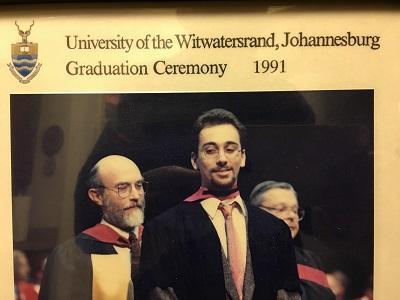
David and Lynne’s son Sven Martin Jacobson was born in 1969 in Cambridge, Mass., USA but, along with Lisa, grew up mostly in South Africa. Inheriting the family’s scientific and entrepreneurial mindsets, he graduated from Wits in electrical engineering in 1991 and with an MBA in 1995. He worked as a software engineer at Teklogic and then joined the Rennies Group in South Africa, rising to the position of board director of the Travel and Financial Services division, responsible for a diverse portfolio which included IT and account management. He and his wife Sonia (née Learmont; Wits BA 1991 and New York University MA), who has practised as a Licensed Master Social Worker in New York City, moved to Brussels in 1999 and then to New York in 2001. They have two sons.
Sven is a partner at Carrot Capital, a venture capital company in the healthcare industry, and CEO of several companies which he formed with Carrot Capital managing partner David Geliebter. They focus on repurposing old and abandoned pharmaceuticals into new treatments for life-threatening conditions. Remedy Pharmaceuticals, of which Sven is the CEO, developed an innovative drug to treat severe stroke and recently sold it to Massachusetts-based Biogen. At present Sven is focusing on his new venture Martin Pharmaceuticals, which is developing a treatment for acute-on-chronic liver failure.
Though Sven concentrates his efforts in the medical world, he regards his education at Wits in electrical engineering and business as excellent preparation. It enabled him to research and understand the science and technologies of pharmaceuticals, communicate effectively with leading medical researchers worldwide, and create pharmaceutical business ventures aimed at alleviating human suffering. He is another determined problem-solver.
David is delighted to have his “friendly giant” (6 foot 3) son as a role model. He credits Sven with great clarity of thinking, creativity and wisdom. They share an interest in reading, travel, food, movies and, above all, how new concepts are created, emerge, and develop to the benefit of humanity.
Looking back at the future
Many of David’s predictions made during the years 2002-2012 at PricewaterhouseCoopers in his role as “futurist” have come to pass:
- the dramatic rise of cloud computing;
- the conviction that “ubiquitous participation”, a concept which he introduced, would become commonplace. It has done so, as a consequence of Steve Jobs’ handheld communications platforms, notably the iPod, iPad and iPhone;
- the emergence of social networking of machines, over and above that of people. He foresees much more depth and breadth of research and innovation being necessary before such automatically corresponding machines and associated Artificial Intelligence will yield the promise currently circulating in the popular media. Perhaps a task for another generation of Jacobsons or Hoakens?
David hopes to pass on the culture of learning and problem-solving to his grandchildren and great-grandchildren. Certainly there will be no shortage of large problems to solve. Perhaps some of the Jacobsons’ work will help the next generation to innovate in space exploration, industry, commerce and healthcare, improve our environment, or even turn the tide on the current wave of autocracy, which is sweeping countries worldwide. The family sees this trend as the most vexing problem of our time.
ACKNOWLEDGEMENTS
GR Bozzoli – Forging Ahead, WUP 1997
GR Bozzoli – A VC Remembers, 1995
